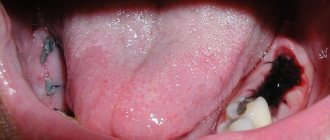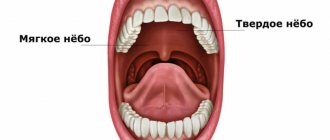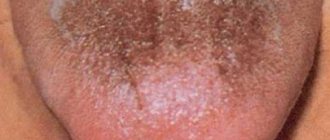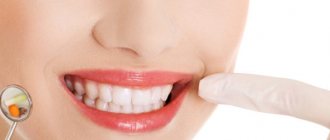January 3, 2019
If you are healthy, then you should not be bothered by the appearance of foreign odors or tastes in your mouth. Naturally, they can arise as a result of consuming certain foods or drinks, which is the norm. But if unpleasant sensations appear that persist for a long time, for example, such as the taste of iodine in the mouth, then you should be wary and closely monitor your condition. To help you with this, the editors of the UltraSmile.ru portal present a selection of the most well-known reasons why this problem may bother you.
What causes the taste of iodine?
Reason No. 1: there is an excess of this microelement in the body
In fact, a microelement such as iodine is very beneficial for the body and is vital, but its excess, as well as its deficiency, can have a very negative impact on your health.
Experts advise consuming the microelement daily (150-300 mcg per day). It can enter the body through food or through dietary supplements and medications. But the whole problem is that this recommendation is very conditional, because due to health, the functioning of the thyroid gland, lifestyle and concomitant diseases, the norm for each person can be completely different - for some it should be doubled, for others reduced. Therefore, under no circumstances take a microelement haphazardly, do not prescribe it yourself, even in the form of supplements, and especially do not take iodine internally in its pure form.
Should not be consumed internally in its pure form
So, if there is a taste of iodine in the mouth, then the main reason for this is its excess in the body, which can occur due to the following circumstances:
- you consume a large amount of iodine-containing foods: algae, sea fish, caviar, seafood. This reason can be called the most harmless, because by consuming fresh seafood, it is almost impossible to upset the balance of iodine in the body - yes, when there is an excess, it is released from a bound state into a free one and can provoke allergies, but when foods are limited, it is easily eliminated and does not cause problems,
- you have been poisoned: if you feel the taste of iodine in your mouth, then the reasons may be due to the fact that the day before you ate seafood again, but their quality and freshness left much to be desired (for example, the same mackerel or tuna could be spoiled, expired, stale) . Doctors speak in this case of histamine poisoning. You can get intoxicated with iodine while working in a specialized industry or living in an environmentally unfavorable area (then the pathology will not appear suddenly, the excess of the microelement will only make itself felt if it accumulates in the body, i.e., after months and years),
- you take medications with iodine or other medications: then you may develop a condition that is medically called “iodism.” With it, not only the taste of iodine will appear in your mouth, but you will also be bothered by an unpleasant iodine odor, increased saliva production, and general weakness. A skin rash, vomiting, and gastrointestinal upset may appear. In women, the problem can be caused by taking hormonal and contraceptive medications.
Excessive consumption of seafood can cause this problem.
What should you do about the problems listed above? Stop taking medications or replace them with others after consultation with your doctor, adjust your diet, consult and get examined by a therapist and endocrinologist to get recommendations and find out exactly what the daily iodine requirement is for you.
“We live near the sea and really love to eat seafood. But doctors, on the contrary, advise limiting yourself, because... There is a very high risk of getting an excess of iodine in the body. But our grandmother is generally a fish lover, she cannot live without it, she even complains that the taste of iodine is constantly in her mouth in the morning. He understands that such a situation could result in problems for the body, but we can’t force him to go to the doctor and doesn’t want to eat differently. What to do with her, how to convince her?... We already know, right..."
Amina, review from correspondence on the woman.ru forum
Associated symptoms
In cases of iodine vapor poisoning, symptoms usually appear quickly and disappear within 1-2 days. In this case, the symptoms are considered:
- runny nose and cough;
- swelling and rupture of the salivary glands;
- skin damage.
When a large amount of iodine is consumed orally, irritation of the throat, pharynx, and respiratory tract occurs , as well as dysfunction of the gastrointestinal tract. The following symptoms appear:
- bad breath for a long time;
- nausea, vomiting;
- change in mucous color to blue;
- burns of the esophagus, stomach, mouth;
- kidney damage.
Iodism may also be accompanied by the following symptoms:
- body temperature above 38ºС;
- constant feeling of thirst;
- general weakness;
- skin rash;
- rhinorrhea and increased secretion of saliva;
- intestinal disorders (nausea, vomiting, diarrhea).
With hyperthyroidism, in addition to the iodine taste, the following symptoms may appear::
- tachycardia;
- increased sweating;
- irritability;
- weakness;
- depressive states;
- headache;
- digestive disorders.
Reason number 2: the thyroid gland does not cope with its function
You will be interested to know that research on the thyroid gland and the importance of the influence of iodine on it began to be carried out at the end of the 19th century. And scientists and doctors were given cause for thought by information about residents of the mountainous regions of the Alps in Switzerland who used water for drinking and cooking that did not contain such a trace element as iodine. The fact is that people in mountainous areas suffered from cretinism to a greater extent than everyone else. This serious disease developed due to the fact that even during embryonic development they did not synthesize the thyroid hormone produced by the thyroid gland. As a result, the brain developed poorly. So scientists have found that people need iodine for good thyroid function.
“It is important for pregnant women to provide themselves with all microelements, including iodine, during the period of bearing a child. If it is deficient, the baby may develop dementia, deafness, and muteness during the formation of vital organs. But it is worth remembering that taking any medications, both for pregnant women and for everyone else, men and women, especially children, should only be taken under the supervision of a doctor. The commercials imposed on us on TV about dietary supplements and vitamins with iodine are a double-edged sword, everything is not as safe as they say,” says O.A. Rumyantseva, an endocrinologist.
The taste of iodine in the mouth can be caused by improper functioning of the thyroid gland.
The thyroid gland is a very important organ that is responsible for the production of hormones that affect the metabolism in the body and are responsible for the balance and stability of the nervous system. So, if the thyroid gland produces few hormones, then the person becomes lethargic and apathetic, and gains weight. If there is a lot, he gets overexcited.
According to statistics, the taste of iodine in the mouth most often occurs in the fair half of humanity. Why? The reasons are related to the characteristics of hormonal levels and its constant changes in women. As a result, women are more likely to suffer from thyroid disease.
So, if there is a taste of iodine in your mouth, then the reasons may be the following:
- hyperthyroidism or hyperfunction of the thyroid gland: excess hormones. It is manifested not only by the taste of iodine, but also by trembling (tremor) of the hands and rapid heartbeat. In this case, a person may suffer from insomnia, he seems very active, and he sweats increased. And one more important feature - the taste of iodine in the mouth is mostly characteristic in the morning. In women, the disease can be triggered by pregnancy or stress. At the first signs of illness, many first go to a cardiologist, because... it is believed that the irregular heartbeat is associated specifically with a heart problem,
- hypothyroidism or hypofunction: lack of hormones. Here, patients are almost always tormented by drowsiness, intelligence disappears, lethargy and indifference appear, blood pressure drops, skin peels and nails break. The less hormones are released, the more the symptoms worsen. The thyroid gland itself enlarges, and a person develops a pronounced goiter. In women in such situations, reproductive function is often impaired, and the risk of miscarriage and even stillbirth increases.
You have a taste of iodine in your mouth and think that this is due to one of the listed pathologies? This means you need to visit an endocrinologist as soon as possible. If the diseases are not advanced, then they will be quite easy to cure. If you have hyperthyroidism, you may need medication, radioactive iodine, or surgery, and if you have hypothyroidism, you may need to take medications.
Treatment
In most cases, a person does not require any special treatment; the taste of iodine in the mouth quickly disappears when the provoking factors are eliminated. If the cause of this symptom was any disease of the internal organs, then the doctor, depending on the diagnosis, will prescribe comprehensive treatment to the patient. In case of poisoning, gastric lavage may be performed.
If taking medications is to blame, you must stop using them. The doctor will select a suitable replacement for those drugs that provoked the appearance of the taste of iodine in the mouth. If the cause was various stresses and overexertion, then sessions with a psychotherapist can have a beneficial effect on the patient’s emotional state and, over time, relieve him of the unpleasant symptom.
If conventional drug therapy for hyperthyroidism does not bring positive results, the doctor may prescribe treatment with radioactive iodine or surgery.
Drug therapy
You should not self-medicate, as this can lead to a serious deterioration in your health and the development of various complications. All medications are selected individually by the attending physician based on the diagnosis and condition of the patient.
- Antithyroid drugs that reduce the hormonal function of the thyroid gland are necessary for hyperthyroidism (Thiamazole, Carbimazole, Propylthiouracil).
- Beta-blockers are necessary to eliminate the symptoms of hyperthyroidism, such as rapid heartbeat, high blood pressure (Anaprilin, Atenolol, Betaloc, Metoprolol).
- Sorbents help remove excess various compounds from the body (Enterosgel, Polysorb).
- Sodium thiosulfate and calcium chloride are a kind of “antidote” for poisoning with iodine-containing products. They are used directly in hospitals under the supervision of doctors.
- Bromine acts on the same receptors as iodine, inhibiting its effect on the body. Due to these properties, bromine preparations are actively used when there is an excess of iodine in the body.
- Sleeping pills are necessary for sleep disorders and nervous tension (Donormil, Valemidin).
- Anxiolytic drugs help eliminate anxiety and nervousness (Afobazol, Mexidol, Teraligen).
- Antidepressants are prescribed for a long-term depressed emotional state (Azafen, Sibazon, Paxil).
- The doctor can prescribe tranquilizers for acute mental conditions that the patient is not able to cope with on his own (Phenazepam, Relanium).
Preparations for eliminating the taste of iodine - photo gallery
Anaprilin is used in the treatment of high blood pressure Afobazol - a mild sedative Enterosgel removes toxins from the body
Diet
Since the diseases that can lead to the appearance of an iodine taste in the mouth are quite specific, doctors give special recommendations to many patients. They must be followed to reduce the content of this trace element in the body. It is necessary to exclude or limit as much as possible the consumption of the following products:
- seafood and sea fish;
- seaweed;
- iodized salt;
- other iodine-containing vegetables and fruits.
To accelerate the removal of iodine from the body, it is useful to consume eggs, milk, starch-based jelly and various vegetable oils.
If there is an excess of iodine in the body, you should avoid consuming iodized salt.
Folk remedies
Some herbal preparations can be used for various diseases that lead to excess iodine in the body. Before using any product, you should consult your doctor, as there are contraindications.
Recipes based on zyuznik
Zyuznik is a very effective plant for the treatment of various diseases associated with hyperfunction of the thyroid gland. It helps normalize the emotional background and stabilizes blood counts. There are several recipes that can be used for hyperthyroidism.
Preparation of the decoction:
- Take one teaspoon of the crushed plant, pour it with one glass of clean drinking water and boil for ten minutes.
- Cool the broth, strain and drink 50 ml three times a day for a week.
Preparation of tincture:
- Collect the top leaves of the sage and add alcohol to them in a ratio of 1:10.
- Pour into a glass bottle, close with a strong lid and leave to infuse for two weeks in a cool, dark room.
- Filter the resulting tincture.
Drink the resulting product once a day, ten drops, with a glass of water. Each week, increase the daily dose by five drops. Having reached the maximum dosage of 40 drops per day, begin to gradually reduce the dosage to the original portion and stop using the product.
Zyuznik is effective in the treatment of diseases associated with hyperfunction of the thyroid gland
Tincture with white cinquefoil
White cinquefoil (popular names: five-fingered, five-fingered, five-fiddled) is a common herbal remedy used for problems with the thyroid gland. The herb regulates its activity and helps normalize the functions of the organ. Five-finger is used for hyperthyroidism, thyrotoxicosis and nodular formations. The plant has a beneficial effect on the synthesis of thyroid-stimulating hormone by the pituitary gland. You can prepare a medicine from white cinquefoil according to the following recipe:
- To make a pentafala tincture, you need to prepare the roots of the plant, wash them thoroughly and chop them.
- The resulting mass is poured with alcohol in a ratio of 1:10 and left for thirty days in a dark room.
Drink 20 drops diluted in two tablespoons of water fifteen minutes before meals. The course of treatment is one month, followed by a break of two weeks, and the procedure is repeated.
White cinquefoil normalizes the function of the thyroid gland, both stimulating it and reducing it
Reason No. 3: you have recently undergone diagnostic measures
The taste of iodine in the mouth after some ultrasound and contrast studies is quite acceptable. It occurs as a consequence of radiography, ultrasound, computed tomography or magnetic resonance imaging. In order to conduct certain types of research efficiently, doctors first introduce a chemical element such as iodine into the patient’s body. Most patients tolerate this procedure without any health consequences, but some may experience both fairly mild and severe complications.
Computed tomography may be accompanied by the introduction of iodine into the body
Relatively mild complications: the appearance of iodine and metallic taste in the mouth, dizziness, nausea, migraine, skin rash like hives, increased blood pressure and shortness of breath. Such consequences may occur in the patient immediately after the procedure, but the reaction may be delayed, for example, it may only disturb you at home and last for several days.
Severe consequences: seizures, swelling of the larynx, cardiac arrest. Such conditions must be excluded at the stage of preparation for the procedure, and if they occur, the patient requires immediate medical attention.
Summary table of reasons why an iodine taste may appear in the mouth
| The main reason | Signs | Recommendations |
| Taking medications, food, hormonal drugs |
|
|
| Thyroid diseases |
|
|
| Liver and gastrointestinal diseases |
|
|
| Destruction of tooth enamel |
|
|
| Stress |
|
|
As you can see, the taste of iodine in the mouth can occur for both fairly harmless and very serious reasons. The main thing you need to remember is that its appearance is largely related to the functioning of the thyroid gland, and an excess or deficiency of this microelement can upset the delicate balance of hormone production necessary for the normal functioning of the body.
Notice
: Undefined variable: post_id in
/home/c/ch75405/public_html/wp-content/themes/UltraSmile/single-item.php
on line
45 Notice
: Undefined variable: full in
/home/c/ch75405/public_html/wp-content /themes/UltraSmile/single-item.php
on line
46
Rate this article:
( 6 ratings, average: 4.33 out of 5)
prevention
Symptoms
Symptoms vary significantly depending on the cause of the iodine taste in the mouth. If the provoking factor was poisoning or an excess of a trace element in the body, then patients may experience the following symptoms:
- With mild negative reactions, some report slight dizziness, nausea, headaches, and skin rashes. Sometimes pain in the abdominal area, weakness, and thirst are added.
- Moderate reactions lead to more severe skin rashes and urticaria. Some patients experience heart rhythm disturbances, low or high blood pressure. Also, the voice may become hoarse, breathing sometimes becomes difficult, shortness of breath and increased salivation appear. There is a burning sensation and sharp pain in the throat.
- A severe reaction of the body to an excess of iodine can have an extremely negative impact on the patient’s condition. Blood pressure sometimes drops to a critical level, convulsions appear, the throat swells, and breathing becomes impossible. In some cases this can be fatal.
Patients with thyroid diseases may suffer from obesity, they experience swelling more often than usual, their mood often changes, and irritability is noted.
Comments
Could it be that the same dosage of iodine affects different people differently?
Dilyara (01/19/2019 at 11:34 am) Reply to comment
- Yes, of course, everything can depend on the individual characteristics of the body. For example, as some scientists claim, people who live in Japan sometimes receive up to 10 times more iodine than the norm, yet they look active and very healthy. And people who live in parts of Russia far from the sea can get anaphylactic shock simply by making an iodine mesh on their chest or eating a tablet with a high concentration of this substance. But this does not mean that these studies should be taken as a guide to action; everything here is purely individual and specialist consultation is required.
Editorial staff of the portal UltraSmile.ru (01/21/2019 at 10:15) Reply to comment
Does the article list all the causes of iodine taste in the mouth? Could this iodine taste be caused by diabetes? Because sometimes there is such a taste, but I don’t have any of the above.
Ekaterina (01/28/2019 at 01:11 pm) Reply to comment
- Ekaterina, yes, maybe so. You should see a doctor.
Editorial staff of the portal UltraSmile.ru (02/01/2019 at 07:32) Reply to comment
I take little food containing iodine. Today and yesterday after eating fried fish, I felt an iodine aftertaste. The main reasons for the appearance of iodine taste in the mouth are often due to food?
Alexey (01/30/2019 at 08:54) Reply to comment
- Alexey, iodine is an important microelement that must be supplied to the body in sufficient quantities. Read our article about the reason. But to find out for sure, you should still consult a doctor.
Editorial staff of the portal UltraSmile.ru (02/01/2019 at 07:13) Reply to comment
The reasons for the appearance of the taste of iodine in the mouth turned out to be frightening, because the thyroid gland should always be in order; if it is abnormal, it is a threat to the entire body. It turns out that you can’t do without tests and specialists? You can't diagnose yourself...
Sveta (01/30/2019 at 09:24) Reply to comment
- That's right! Making diagnoses yourself is very dangerous for your health!
Editorial staff of the portal UltraSmile.ru (01/31/2019 at 15:21) Reply to comment
I didn’t know that the cause of the taste of iodine in the mouth could be a manifestation of thyroid disease. This often happens, I thought it was due to poor quality food. And in order to find out more precisely what problems are with it, what tests need to be taken?
Julia (01/30/2019 at 07:49 pm) Reply to comment
- Yulia, an endocrinologist should tell you this after a visual examination and collection of your complaints. Please consult a doctor.
Editorial staff of the portal UltraSmile.ru (01/31/2019 at 15:01) Reply to comment
Since yesterday I have been tormented by this strange and incomprehensible taste of iodine in my mouth, which is completely out of place. I didn’t know that the cause of this taste in the mouth could be tooth decay. I am very afraid of dentists and don’t want to go to doctors.. Please tell me how serious are the carious lesions and increased sensitivity of the teeth that I began to feel the taste of iodine? Should I sound the alarm?
Katya (02/04/2019 at 17:33) Reply to comment
The reasons for the appearance of the taste of iodine in the mouth turned out to be not very pleasant, but I had this once, but then somehow it went away. Does it make sense to go to the hospital now to get tested?
Alena (02/04/2019 at 18:07) Reply to comment
I just got tested for my thyroid gland. The endocrinologist did not ask if I had such a symptom. Nothing bad was discovered. Should I tell my doctor that I sometimes experience this taste so that I can be retested? Or is there another reason for the taste of iodine in the mouth, should I contact other specialists?
Ekaterina (02/04/2019 at 22:22) Reply to comment
I would never have thought that a simple x-ray could be the cause of the taste of iodine in the mouth. Has this really happened to anyone? In general, these reasons are so diverse.
Inna Olegovna (02/04/2019 at 23:19) Reply to comment
The reasons for the taste of iodine in the mouth are different, but I can’t find one that applies to me. Could this be due to the fact that we often eat sea fish? Not in large quantities, but we eat it three times a week.
Olga (02/12/2019 at 01:34 pm) Reply to comment
The reasons for the appearance of the taste of iodine in the mouth are varied, but can they occur precisely after consuming iodomarin? The doctor didn’t prescribe it, she started drinking on her own. It didn’t start right away, about a week after I started taking it.
Vera (02/12/2019 at 01:46 pm) Reply to comment
The reasons for the appearance of the taste of iodine in the mouth are clear. But what about children, how can they recognize a lack or, conversely, an excess of iodine, because they themselves cannot detect the taste of iodine in their mouth? Smell? Tests?
Ekaterina (02/12/2019 at 15:58) Reply to comment
Write your comment Cancel reply
Why does it occur in children?
The main factors for the appearance of iodine odor in children are:
- poor oral hygiene;
- caries;
- infections and inflammations;
- poor nutrition.
Significant physiological changes and rapid growth of the child also contribute to the appearance of iodine odor. This is especially true for tooth growth and oral development.
Other reasons for the smell of iodine on the breath of children:
- long holiday at sea;
- infectious diseases of the throat, tonsils or inflammatory processes in the adenoids;
- reflux;
- gastrointestinal tract infections;
- taking iodine-containing medications or products artificially enriched with iodine (milk, baked goods).









